JAVA练习题含答案-answers to pratice 4
java基础50道经典练习题及答案
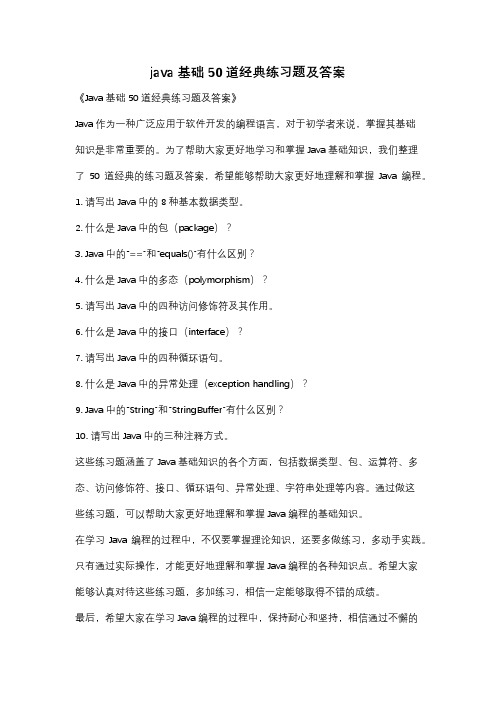
java基础50道经典练习题及答案《Java基础50道经典练习题及答案》Java作为一种广泛应用于软件开发的编程语言,对于初学者来说,掌握其基础知识是非常重要的。
为了帮助大家更好地学习和掌握Java基础知识,我们整理了50道经典的练习题及答案,希望能够帮助大家更好地理解和掌握Java编程。
1. 请写出Java中的8种基本数据类型。
2. 什么是Java中的包(package)?3. Java中的“==”和“equals()”有什么区别?4. 什么是Java中的多态(polymorphism)?5. 请写出Java中的四种访问修饰符及其作用。
6. 什么是Java中的接口(interface)?7. 请写出Java中的四种循环语句。
8. 什么是Java中的异常处理(exception handling)?9. Java中的“String”和“StringBuffer”有什么区别?10. 请写出Java中的三种注释方式。
这些练习题涵盖了Java基础知识的各个方面,包括数据类型、包、运算符、多态、访问修饰符、接口、循环语句、异常处理、字符串处理等内容。
通过做这些练习题,可以帮助大家更好地理解和掌握Java编程的基础知识。
在学习Java编程的过程中,不仅要掌握理论知识,还要多做练习,多动手实践。
只有通过实际操作,才能更好地理解和掌握Java编程的各种知识点。
希望大家能够认真对待这些练习题,多加练习,相信一定能够取得不错的成绩。
最后,希望大家在学习Java编程的过程中,保持耐心和坚持,相信通过不懈的努力,一定能够掌握好Java编程的基础知识,成为一名优秀的Java程序员。
祝大家学习进步,早日掌握Java编程!。
Java 网络编程练习题及答案

Java 网络编程练习题及答案Java 网络编程是指利用Java语言进行网络通信和传输数据的技术。
在日常的软件开发和网络应用中,网络编程是一个非常重要的方向。
本文将提供一些Java网络编程的练习题,并给出相应的答案,以帮助读者更好地掌握这一技术。
一、基础练习题1. 编写一个简单的Java程序,实现客户端向服务器端发送消息,并在服务器端打印接收到的消息。
```java// 客户端代码import java.io.*;import .*;public class Client {public static void main(String[] args) throws IOException {Socket socket = new Socket("localhost", 8888);OutputStream outputStream = socket.getOutputStream();PrintWriter out = new PrintWriter(outputStream, true);out.println("Hello, Server!");InputStream inputStream = socket.getInputStream();BufferedReader in = new BufferedReader(new InputStreamReader(inputStream));String response = in.readLine();System.out.println("Server: " + response);out.close();in.close();socket.close();}}// 服务器端代码import java.io.*;import .*;public class Server {public static void main(String[] args) throws IOException {ServerSocket serverSocket = new ServerSocket(8888);System.out.println("Server is running...");Socket socket = serverSocket.accept();InputStream inputStream = socket.getInputStream();BufferedReader in = new BufferedReader(new InputStreamReader(inputStream));String request = in.readLine();System.out.println("Client: " + request);OutputStream outputStream = socket.getOutputStream();PrintWriter out = new PrintWriter(outputStream, true);out.println("Hello, Client!");out.close();in.close();socket.close();serverSocket.close();}}```2. 编写一个Java程序,实现多个客户端同时向服务器端发送请求,并在服务器端打印接收到的请求。
Java基础练习题 附答案
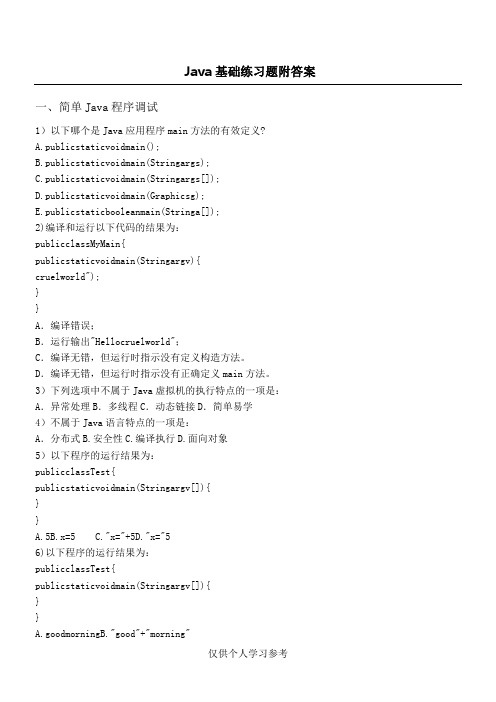
11)以下程序的输出结果为
publicclasstest{
publicstaticvoidmain(Stringagrs[]){
charc1=’B’,c2=’C’;
if(c1+1<c2)++c1;
}
}
A.BB.bC.CD.c
12)假设a是int类型变量,并初始化为1,则下列哪个为合法的条件语句?
}
}
A.0B.1 C.5D.4E.24
2)设有如下类
classLoop{
publicstaticvoidmain(String[]agrs){
intx=0;inty=0;
outer:
for(x=0;x<100;x++){
middle:
for(y=0;y<100;y++){
y="+y);
if(y==10){<<<insertcode>>>}
B.第9行出现运行错误;
C.输出True
D.输出False
8)以下程序的编译和运行结果为?
classtest{
staticbooleancheck;
publicstaticvoidmain(Stringargs[]){
inti;
if(check==true)
i=1;
else
i=2;
if(i=2)i=i+2;
E.publicstaticbooleanmain(Stringa[]);
2)编译和运行以下代码的结果为:
publicclassMyMain{
java考试编程题库及答案

java考试编程题库及答案Java考试编程题库及答案1. 基础语法题- 题目:编写一个Java程序,实现两个整数的加法运算,并打印结果。
- 答案:```javapublic class Addition {public static void main(String[] args) {int num1 = 5;int num2 = 10;int sum = num1 + num2;System.out.println("The sum is: " + sum);}}```2. 控制结构题- 题目:编写一个Java程序,判断一个整数是否为素数,并打印结果。
- 答案:```javapublic class PrimeCheck {public static void main(String[] args) {int number = 29;if (isPrime(number)) {System.out.println(number + " is a primenumber.");} else {System.out.println(number + " is not a prime number.");}}public static boolean isPrime(int n) {if (n <= 1) return false;for (int i = 2; i <= Math.sqrt(n); i++) {if (n % i == 0) return false;}return true;}}```3. 数组与循环题- 题目:编写一个Java程序,打印数组中所有元素的平方。
- 答案:```javapublic class SquareElements {public static void main(String[] args) {int[] numbers = {1, 2, 3, 4, 5};for (int i = 0; i < numbers.length; i++) {int square = numbers[i] * numbers[i];System.out.println("Square of " + numbers[i] + " is " + square);}}}4. 面向对象题- 题目:定义一个名为`Car`的类,包含属性`color`和`speed`,以及一个方法`increaseSpeed(int increment)`来增加速度。
java基础练习题及答案
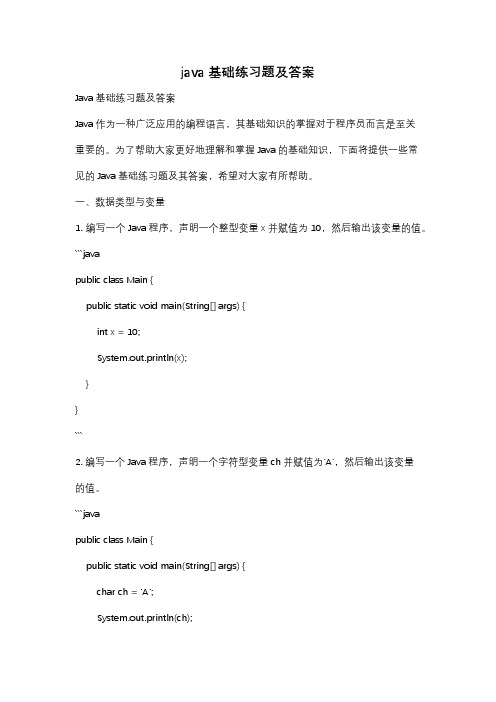
java基础练习题及答案Java基础练习题及答案Java作为一种广泛应用的编程语言,其基础知识的掌握对于程序员而言是至关重要的。
为了帮助大家更好地理解和掌握Java的基础知识,下面将提供一些常见的Java基础练习题及其答案,希望对大家有所帮助。
一、数据类型与变量1. 编写一个Java程序,声明一个整型变量x并赋值为10,然后输出该变量的值。
```javapublic class Main {public static void main(String[] args) {int x = 10;System.out.println(x);}}```2. 编写一个Java程序,声明一个字符型变量ch并赋值为'A',然后输出该变量的值。
```javapublic class Main {public static void main(String[] args) {char ch = 'A';System.out.println(ch);}```3. 编写一个Java程序,声明一个布尔型变量isTrue并赋值为true,然后输出该变量的值。
```javapublic class Main {public static void main(String[] args) {boolean isTrue = true;System.out.println(isTrue);}}```二、运算符1. 编写一个Java程序,计算两个整数的和并输出结果。
```javapublic class Main {public static void main(String[] args) {int a = 10;int b = 20;int sum = a + b;System.out.println("两个整数的和为:" + sum);}```2. 编写一个Java程序,计算两个整数的商并输出结果。
java基础练习题带答案.doc
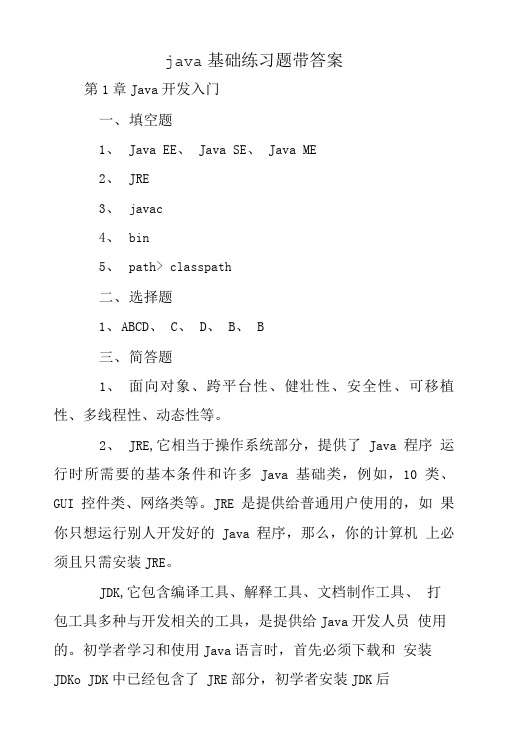
java基础练习题带答案第1章Java开发入门一、填空题1、Java EE、Java SE、Java ME2、JRE3、javac4、bin5、path> classpath二、选择题1、A BCD、C、D、B、 B三、简答题1、面向对象、跨平台性、健壮性、安全性、可移植性、多线程性、动态性等。
2、JRE,它相当于操作系统部分,提供了Java程序运行时所需要的基本条件和许多Java基础类,例如,10类、GUI控件类、网络类等。
JRE是提供给普通用户使用的,如果你只想运行别人开发好的Java程序,那么,你的计算机上必须且只需安装JRE。
JDK,它包含编译工具、解释工具、文档制作工具、打包工具多种与开发相关的工具,是提供给Java开发人员使用的。
初学者学习和使用Java语言时,首先必须下载和安装JDKo JDK中已经包含了JRE部分,初学者安装JDK后不必再去下载和安装JRETo四、编程题public class HelloWorld {} public static void main { } System, out. printin;第2章Java编程基础一、填空题1、class2、true 和false3、单行注释、多行注释、文档注释4、基本数据类型、引用数据类型5、1、2、4、86、& && |7、08、9、10、6二、判断题1、错、对、错、对、错三、选择题1、AD、AD、C、ABCD、 C 、A、AC、A、 B 10、A四、程序分析题1、编译不通过。
int值4和b相加时,由于变量b 的类型为byte,取值范围没有int类型大,存不下int 类型的值,因此编译不通过。
2、编译不通过。
这是因为y是在最里层的代码块中定义的一个变量,只有在那个代码块中才可使用,在使用y = x;语句时已经超过了y变量的作用域,所以编译无法通过。
3、打印结果为:3o4、打印结果为:987五、问答题1、J ava语言的八种基本数据类型有:byte字节型,占一个字节。
java语句练习题及答案

java语句练习题及答案标题:Java语句练习题及答案解析引言:Java语言是一种广泛应用于软件开发领域的高级编程语言,掌握Java语句的基本使用方法对于学习和应用Java编程至关重要。
本文将为大家提供一些常见的Java语句练习题,并附上详细的答案解析,帮助读者加深对Java语句的理解和掌握。
1. 输出Hello, World!题目描述:请编写一段Java代码,输出字符串"Hello, World!"。
解答:```javapublic class HelloWorld {public static void main(String[] args) {System.out.println("Hello, World!");}}```答案解析:在Java中,使用`System.out.println()`方法可以将括号内的内容输出到控制台。
以上代码定义了一个名为`HelloWorld`的类,其中`main`方法是程序的入口点,通过调用`System.out.println()`方法输出了字符串"Hello, World!"。
2. 计算两个整数的和题目描述:请编写一段Java代码,计算两个整数的和,并将结果输出。
解答:```javapublic class Sum {public static void main(String[] args) {int num1 = 5;int num2 = 3;int sum = num1 + num2;System.out.println("两个整数的和为:" + sum);}}```答案解析:以上代码定义了一个名为`Sum`的类,其中声明了两个整型变量`num1`和`num2`,并将它们相加得到结果存储在变量`sum`中。
最后,通过调用`System.out.println()`方法输出了结果。
java基础入门考试题目及答案
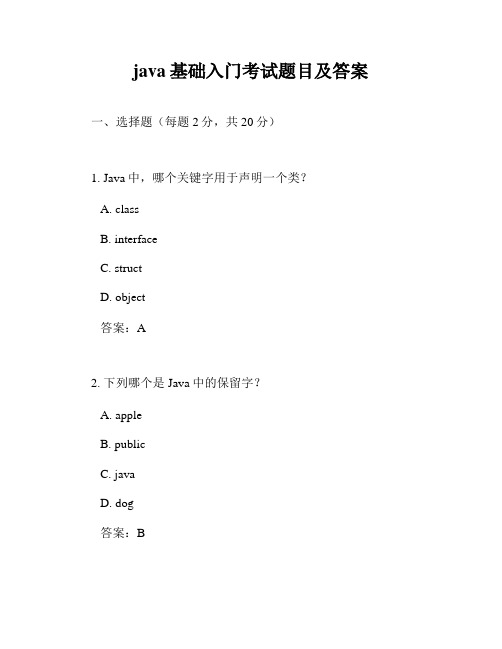
java基础入门考试题目及答案一、选择题(每题2分,共20分)1. Java中,哪个关键字用于声明一个类?A. classB. interfaceC. structD. object答案:A2. 下列哪个是Java中的保留字?A. appleB. publicC. javaD. dog答案:B3. Java中,哪个方法用于获取字符串的长度?A. length()B. size()C. count()D. length答案:A4. 在Java中,哪个关键字用于定义一个方法?A. functionB. methodC. defD. void答案:D5. Java中,哪个关键字用于声明一个接口?A. classB. interfaceC. structD. object答案:B6. Java中,哪个关键字用于声明一个包?A. packageB. importC. classD. public答案:A7. Java中,哪个关键字用于实现多重继承?A. extendsB. implementsC. extends and implementsD. None of the above答案:B8. 在Java中,哪个关键字用于声明一个变量?A. varB. letC. defD. val答案:A9. Java中,哪个关键字用于声明一个常量?A. finalB. constC. staticD. var答案:A10. 在Java中,哪个关键字用于抛出一个异常?A. throwB. throwsC. catchD. try答案:B二、填空题(每题2分,共20分)1. Java是一种_________语言,它支持跨平台运行。
答案:面向对象2. Java程序的执行入口是_________方法。
答案:main3. 在Java中,所有的类都是_________类的子类。
答案:Object4. Java中,用于声明一个私有方法的关键字是_________。
java的考试题及答案
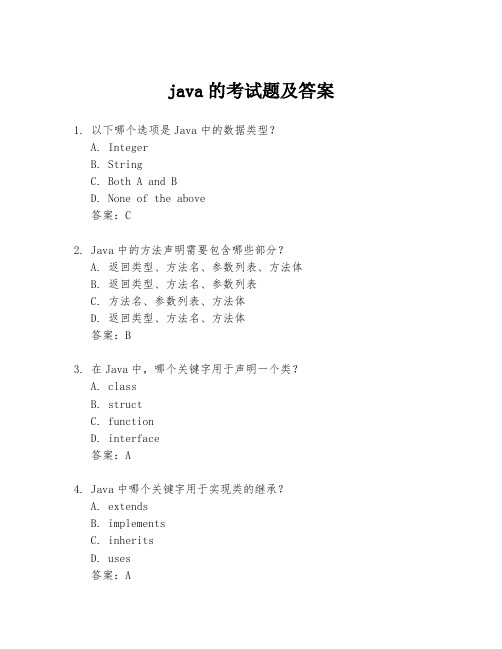
java的考试题及答案1. 以下哪个选项是Java中的数据类型?A. IntegerB. StringC. Both A and BD. None of the above答案:C2. Java中的方法声明需要包含哪些部分?A. 返回类型、方法名、参数列表、方法体B. 返回类型、方法名、参数列表C. 方法名、参数列表、方法体D. 返回类型、方法名、方法体答案:B3. 在Java中,哪个关键字用于声明一个类?A. classB. structC. functionD. interface答案:A4. Java中哪个关键字用于实现类的继承?A. extendsB. implementsC. inheritsD. uses答案:A5. Java中的多态性是如何实现的?A. 通过方法重载B. 通过方法覆盖C. 通过接口实现D. 通过抽象类和接口答案:D6. 在Java中,以下哪个选项是正确的数组初始化方式?A. int[] myArray = new int[5];B. int myArray[] = new int[5];C. Both A and BD. None of the above答案:C7. Java中,哪个关键字用于声明一个接口?A. classB. structC. interfaceD. enum答案:C8. 在Java中,以下哪个选项是正确的异常处理语句?A. try-catchB. try-finallyC. Both A and BD. None of the above答案:C9. Java中,哪个关键字用于声明一个枚举类型?A. enumB. enumarateC. enumerationD. list答案:A10. 在Java中,以下哪个选项是正确的泛型类声明?A. List<String> myList;B. List myList;C. Both A and BD. None of the above答案:A。
java基础练习题及答案
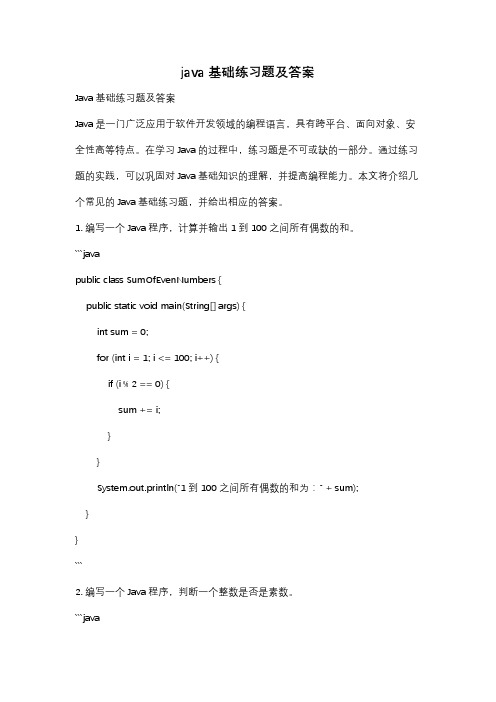
java基础练习题及答案Java基础练习题及答案Java是一门广泛应用于软件开发领域的编程语言,具有跨平台、面向对象、安全性高等特点。
在学习Java的过程中,练习题是不可或缺的一部分。
通过练习题的实践,可以巩固对Java基础知识的理解,并提高编程能力。
本文将介绍几个常见的Java基础练习题,并给出相应的答案。
1. 编写一个Java程序,计算并输出1到100之间所有偶数的和。
```javapublic class SumOfEvenNumbers {public static void main(String[] args) {int sum = 0;for (int i = 1; i <= 100; i++) {if (i % 2 == 0) {sum += i;}}System.out.println("1到100之间所有偶数的和为:" + sum);}}```2. 编写一个Java程序,判断一个整数是否是素数。
```javapublic class PrimeNumber {public static void main(String[] args) {int num = 29;boolean isPrime = true;for (int i = 2; i <= Math.sqrt(num); i++) {if (num % i == 0) {isPrime = false;break;}}if (isPrime) {System.out.println(num + "是素数。
");} else {System.out.println(num + "不是素数。
");}}}```3. 编写一个Java程序,找出一个字符串中出现次数最多的字符及其出现次数。
```javapublic class MostFrequentCharacter {public static void main(String[] args) {int[] count = new int[256];for (int i = 0; i < str.length(); i++) {count[str.charAt(i)]++;}int maxCount = 0;char mostFrequentChar = ' ';for (int i = 0; i < count.length; i++) {if (count[i] > maxCount) {maxCount = count[i];mostFrequentChar = (char) i;}}System.out.println("出现次数最多的字符是:" + mostFrequentChar); System.out.println("出现次数:" + maxCount);}}```4. 编写一个Java程序,将一个字符串反转输出。
Java试题附参考答案讲解

附录B 参考答案第1章:Java简介——实践与练习1.7.1 填空题1.Java源程序文件的后缀是*.java ,Java字节码文件的后缀名称是*.class 。
2.Java程序实现可移值性,依靠的是JVM 。
3.Java语言的三个分支是:Java SE 、Java ME 、Java EE 。
4.Java程序由类组成,如果Java使用public class 声明类,则文件名称必须与类名称一致。
5.Java执行是从main() 方法开始执行的,此方法的完整定义是public static void main(String args) 。
6.Java类名的每个单词的首字母通常要求大写。
1.7.2 选择题1.推出Java语言的公司是 B 。
A.IBM B.SUN C.Apple D.Microsoft 2.下面的哪个环境变量是java解释时所需要的? BA.path B.classpath C.JAVA_HOME D、TEMP1.7.3 判断题1.Java语言属于编译型的开发语言。
(×)2.Java Application程序不是由main()方法开始执行的。
(×)1.7.4 简答题1.简述Java实现可移值性的基本原理。
答:Java属于编译型和解释型的编程语言,所有的*.java程序必须编译为*.class文件后才可以在电脑上执行,而执行*.class文件的电脑并不是一台真实的电脑,而是利用软件和硬件模拟J ava核心技术精讲Note 出来的一台虚拟电脑,称为Java虚拟机,而针对不同的操作系统平台,有不同版本的Java虚拟机,即由Java虚拟机去适应不同的操作系统,只要Java虚拟机的支持没有改变,同一个*.class 可以在不同的平台上运行。
2.简述Java语言的三个程序分支。
答:Java SE(Java标准版):提供基础的Java类库及平台支持。
Java ME(Java微型版):提供嵌入式开发支持。
java_开发实战经典_第四章课后习题答案_完整版.doc

for(inti=0; i<score.length; i++){
if(max<score[i]){
max = score[i];
}
}
System.out.printin (”最分为:n+max);
}
}
第八题
public classFour08 {
public static voidmain(String[] args){
switch(Array[i] ) {
case1:{
nl++;
break;
}
case2:{
n2 + +;
break;
}
case3:{
n3 + + ;
break;
}
case4:{
n4++;
break;
}
case5:{
n5++;
break;
}
case6:{
n6++;
break;
}
case7:{
n7 + + ;
}
}
第二题
public static voidmain(String[]args){
inta[]={1,2,3,4,5.6,7,8,9,10,11};
int0=0,e=0;
for(inti=0 ;•丄ength; i++){
if(a[i]%2==0){
e++;
}else{
o++;
}
}
System,out.printIn("奇数个数为:”+o+”\t” + ”偶数个数为:”+e);
(完整版)java练习题(含答案)

1.编写程序,用数组实现乘法小九九的存储和输出。
【提示:采用多个一维数组。
】public class Multipation {public static void main(String[] args) {// TODO Auto-generated method stubint x[][]=new int[9][9];for(int i=0;i<9;i++){for(int j=0;j<9;j++){if(i>=j){int m=i+1;int n=j+1;x[i][j]=m*n;System.out.print(m+"*"+n+"="+x[i][j]);}}System.out.println();}}}2. 定义一个类Student,属性为学号、姓名和成绩;方法为增加记录SetRecord和得到记录GetRecord。
SetRecord给出学号、姓名和成绩的赋值,GetRecord通过学号得到考生的成绩。
public class Student {/***@param args*/private int ID;private String name;private float score;public void SetRecord(int ID,String name,float score){this.ID=ID;=name;this.score=score;}public float getRecord(int ID){if(ID==this.ID)return this.score;elsereturn -1;}public static void main(String[] args) {// TODO Auto-generated method stubStudent s=new Student();s.SetRecord(0,"alex",100);float Sco=s.getRecord(0);System.out.print(Sco);}}3.给出上题中设计类的构造函数,要求初始化一条记录(学号、姓名、成绩)。
java基础练习题
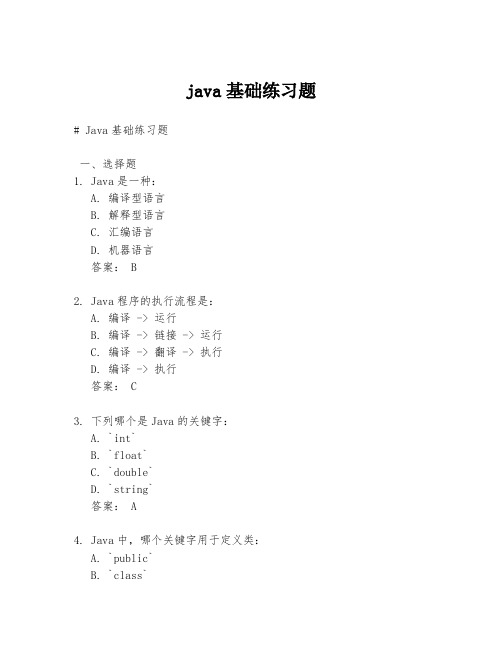
java基础练习题# Java基础练习题一、选择题1. Java是一种:A. 编译型语言B. 解释型语言C. 汇编语言D. 机器语言答案: B2. Java程序的执行流程是:A. 编译 -> 运行B. 编译 -> 链接 -> 运行C. 编译 -> 翻译 -> 执行D. 编译 -> 执行答案: C3. 下列哪个是Java的关键字:A. `int`B. `float`C. `double`D. `string`答案: A4. Java中,哪个关键字用于定义类:A. `public`B. `class`C. `interface`D. `void`答案: B5. Java中,哪个不是合法的标识符:A. `myClass`B. `class`C. `2variable`D. `Variable`答案: C二、填空题1. Java语言的跨平台特性是通过______实现的。
答案: Java虚拟机(JVM)2. Java的基本数据类型包括:byte, short, int, long, float, double, char, ______。
答案: boolean3. 在Java中,使用______关键字可以定义一个方法。
答案: void 或者其他返回类型4. Java中,一个类可以有多个构造方法,只要它们的______列表不同。
答案:参数5. Java中,`System.out.println()`用于______。
答案:输出信息到控制台三、简答题1. 简述Java的垃圾回收机制。
答案: Java的垃圾回收机制是一种自动内存管理功能,它负责回收不再使用的对象所占用的内存。
垃圾回收器定期检查内存中的对象,识别那些不再被任何引用指向的对象,并将它们从内存中清除,释放内存资源。
2. 描述Java中的继承和多态的概念。
答案:继承是Java中一个类(子类)可以继承另一个类(父类)的属性和方法。
java考试题及答案
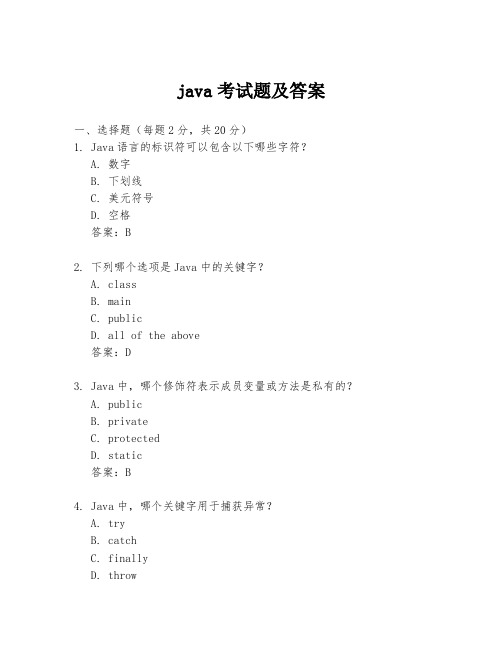
java考试题及答案一、选择题(每题2分,共20分)1. Java语言的标识符可以包含以下哪些字符?A. 数字B. 下划线C. 美元符号D. 空格答案:B2. 下列哪个选项是Java中的关键字?A. classB. mainC. publicD. all of the above答案:D3. Java中,哪个修饰符表示成员变量或方法是私有的?A. publicB. privateC. protectedD. static答案:B4. Java中,哪个关键字用于捕获异常?A. tryB. catchC. finallyD. throw答案:B5. 在Java中,下列哪个数据类型是基本数据类型?A. StringB. intC. ArrayListD. HashMap答案:B6. 下列哪个选项不是Java集合框架的一部分?A. ListB. MapC. SetD. String答案:D7. Java中,哪个关键字用于定义接口?A. classB. interfaceC. abstractD. final答案:B8. 在Java中,下列哪个选项不是线程安全的?A. VectorB. ArrayListC. LinkedListD. HashMap答案:B9. Java中,下列哪个选项是正确的继承关系?A. Object is a subclass of StringB. String is a subclass of ObjectC. Object is a superclass of StringD. String is a superclass of Object答案:B10. 下列哪个选项不是Java中的访问修饰符?A. publicB. privateC. protectedD. global答案:D二、填空题(每题2分,共20分)1. Java中,用于定义类的关键字是______。
答案:class2. Java中,用于定义接口的关键字是______。
java练习题+答案

java练习题+答案1、在下列说法中,选出最正确的一项是( )。
1.Java语言是以类为程序的基本单位的2.Java语言是不区分大小写的3.多行注释语句必须以//开始4.在Java语言中,类的源文件名和该类名可以不相同2、下列选项中不属于Java虚拟机的执行特点的一项是( )。
1.异常处理2.多线程3.动态链接4.简单易学3、下列选项中属于Java语言的垃圾回收机制的一项是( )。
1.语法检查2.堆栈溢出检查3.跨平台4.内存跟踪4、下列选项中属于 Java语言的安全性的一项是( )。
1.动态链接2.高性能3.访问权限4.内存跟踪5、下列选项中,属丁JVM执行过程中的特点的一项是( )。
1.编译执行2.多进程3.异常处理4.静态链接6、在Java语言中,那一个是最基本的元素?()1.方法2.包3.对象4.接口7、如果有2个类A和B,A类基于 B类,则下列描述中正确的一个是( )。
1.这2个类都是子类或者超类2.A是B超类的子类3.B是A超类的子类4.这2个类郡是对方的子类8、使用如下哪个保留字可以使只有在定义该类的包中的其他类才能访问该类?()1.abstract2.private3.protected4.不使用保留字9、编译一个定义了3个类和10个办法的Java源文件后,会产生多少个字符码文件,扩展名是什么?()1.13个字节码文件,扩展名是.class2.1个字节码文件,扩展名是.class3.3个字节码文件,扩展名是.java4.3个字节码文件,扩展名是.class10、下列属于Java语言的特点的一项是( )。
1.运算符重载2.类间多重继承3.指针操作4.垃圾回收11、在创建Applet应用程序时,需要用户考虑的问题是( )。
1.窗口如何创建2.绘制的图形在窗口中的位置3.程序的框架4.事件处理12、于Java语言的内存回收机制,下列选项中最正确的一项是( )。
1.Java程序要求用户必须手工创建一个线程来释放内存2.Java程序允许用户使用指针来释放内存3.内存回收线程负责释放无用内存4.内存回收线程不能释放内存对象13、下列关于Java程序结构的描述中,不正确的一项是( )。
java编程练习题及答案

java编程练习题及答案Java编程练习题及答案Java作为一种广泛应用的编程语言,其学习和实践对于程序员来说至关重要。
在学习Java的过程中,编程练习题是一种非常有效的学习方法。
通过解决编程练习题,可以提升自己的编程能力,加深对Java语言的理解,并锻炼解决问题的能力。
本文将介绍一些常见的Java编程练习题及其答案,希望对初学者和有一定经验的程序员都能有所帮助。
1. 判断一个数是否为素数题目要求:编写一个方法,判断一个给定的整数是否为素数。
解答:```javapublic static boolean isPrime(int num) {if (num <= 1) {return false;}for (int i = 2; i <= Math.sqrt(num); i++) {if (num % i == 0) {return false;}}return true;}2. 查找数组中的最大值和最小值题目要求:编写一个方法,找出给定整型数组中的最大值和最小值。
解答:```javapublic static void findMinMax(int[] arr) {if (arr == null || arr.length == 0) {return;}int min = arr[0];int max = arr[0];for (int i = 1; i < arr.length; i++) {if (arr[i] < min) {min = arr[i];}if (arr[i] > max) {max = arr[i];}}System.out.println("最小值: " + min);System.out.println("最大值: " + max);}3. 反转字符串题目要求:编写一个方法,将给定的字符串反转。
解答:```javapublic static String reverseString(String str) {if (str == null) {return null;}StringBuilder sb = new StringBuilder(str);return sb.reverse().toString();}```4. 判断两个字符串是否为Anagram题目要求:编写一个方法,判断两个给定的字符串是否为Anagram(由颠倒字母顺序而构成的单词)。
计算机程序设计员(java)四级模拟试卷及答案

一体化考核模拟试卷及答案计算机程序设计员(Java)(四级)试卷注意事项考试时间:180min。
请首先按要求在试卷的标封处填写您的姓名、准考证号和所在单位的名称。
请仔细阅读各种题目的回答要求,在规定的位置填写您的答案。
第一部分第二部分总分得分第一部分Java2编程技术基础得分评分人一、单项选择题(第1题~第20题。
选择一个正确答案,将相应的字母填入题内的括号中。
每题0.5分,满分10分)1.以下几项,编译正确的是()。
A.double f=1.3f;B.char c=’\u0ffff’;C.boolean b=null;D.int i=1E3;2. 编译如下代码会出现什么情况?()。
class MyClass{public static void main(String args[]){mthd(args);}public void mthd(String[] args){System.out.println(args.length);}}A.main方法声明有错B.无法从静态上下文中引用非静态方法mthdC.mthd方法参数类型不匹配D.语句“System.out.println(args.length);”有错3. 以下几项编译正确的是()。
A. import java.util.Date;package mypackage.*;class Myclass{}B. package mypackage.*;import java.util.Date;class MyClass{}C. /*comment*/package mypackage;import java.util.*;class MyClass{}D. import java.util.*;package mypackage;class MyClass{}4. 对于byte类型的可表示范围,说法正确的是()。
A. 从0到255B. 从-128到127C. 从-256到255D. 根据java虚拟机的具体实现而定5. 代码如下:public class MyClass{public static void main(String args[]){System.out.println(args[2]);}}运行java MyClass Hello World将输出的结果是()。
java练习题及答案
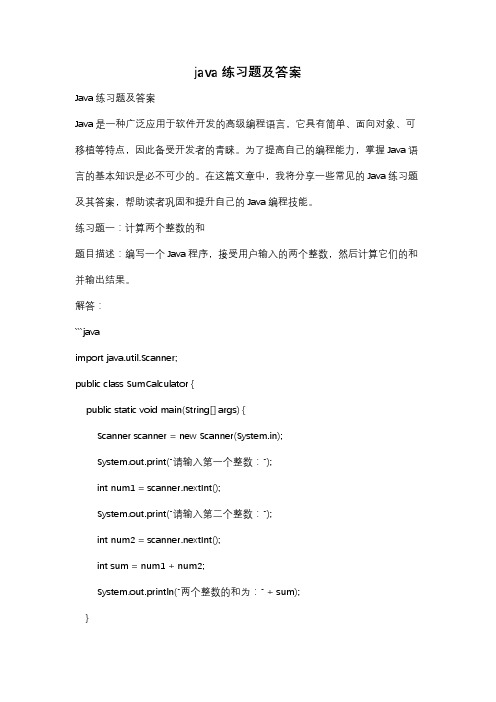
java练习题及答案Java练习题及答案Java是一种广泛应用于软件开发的高级编程语言,它具有简单、面向对象、可移植等特点,因此备受开发者的青睐。
为了提高自己的编程能力,掌握Java语言的基本知识是必不可少的。
在这篇文章中,我将分享一些常见的Java练习题及其答案,帮助读者巩固和提升自己的Java编程技能。
练习题一:计算两个整数的和题目描述:编写一个Java程序,接受用户输入的两个整数,然后计算它们的和并输出结果。
解答:```javaimport java.util.Scanner;public class SumCalculator {public static void main(String[] args) {Scanner scanner = new Scanner(System.in);System.out.print("请输入第一个整数:");int num1 = scanner.nextInt();System.out.print("请输入第二个整数:");int num2 = scanner.nextInt();int sum = num1 + num2;System.out.println("两个整数的和为:" + sum);}}```练习题二:判断一个数是否为素数题目描述:编写一个Java程序,判断用户输入的一个整数是否为素数(质数),如果是素数则输出"是素数",否则输出"不是素数"。
解答:```javaimport java.util.Scanner;public class PrimeNumberChecker {public static void main(String[] args) {Scanner scanner = new Scanner(System.in);System.out.print("请输入一个整数:");int num = scanner.nextInt();boolean isPrime = true;for (int i = 2; i <= Math.sqrt(num); i++) {if (num % i == 0) {isPrime = false;break;}}if (isPrime) {System.out.println(num + "是素数");} else {System.out.println(num + "不是素数");}}}```练习题三:查找数组中的最大值和最小值题目描述:编写一个Java程序,查找一个整型数组中的最大值和最小值,并输出结果。
JAVA练习题含答案-answers to pratice 4
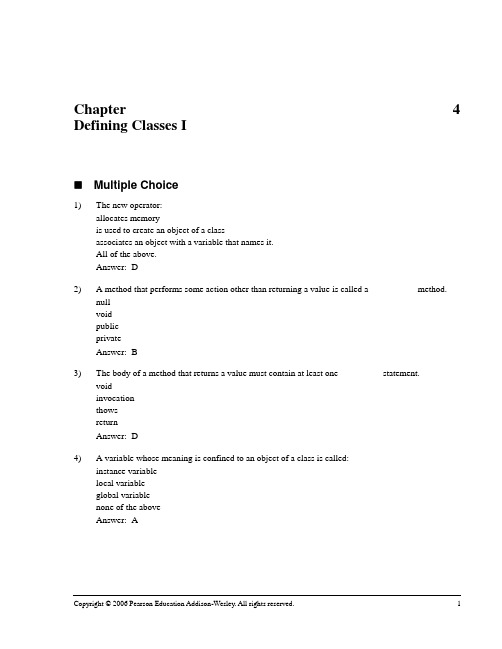
result *= x;
}
else
{
result = 0;
System.out.println("Fatal error.......positive integers required!");
}
return result;
}
Write a method called isEqual that returns a Boolean value. The method compares two integers for equality.
The modifiers public and private can both be used with methods and instance variables. Any instance variable can be labeled either public or private. The modifier public means that there are no restrictions on where the instance variable can be used. The modifier private means that the instance variable cannot be accessed by name outside of the class definition.
if(checkDayOfWeek(dow))
dayOfWeek = dow;
else
System.out.println("Fatal error....invalid day of week value!");
- 1、下载文档前请自行甄别文档内容的完整性,平台不提供额外的编辑、内容补充、找答案等附加服务。
- 2、"仅部分预览"的文档,不可在线预览部分如存在完整性等问题,可反馈申请退款(可完整预览的文档不适用该条件!)。
- 3、如文档侵犯您的权益,请联系客服反馈,我们会尽快为您处理(人工客服工作时间:9:00-18:30)。
dayOfWeek = dow;
else
System.out.println("Fatal error....invalid day of week value!");
}
public void setMonth(String m)
{
/**Valid values are strings January–December*/
It is considered good programming practice to make all instance variables private, but there are times when the values of the instance variables need to be accessed or updated. Accessor methods allow you to obtain the data, while mutator methods allow you to change the data in a class object. A mutator method can verify the validity of a value before updating the instance variable.
public class Appointment
{
privateint startTime;
privateint endTime;
privateString dayOfWeek;
privateString month;
privateint day;
privateint year;
/**Mutator methods*/
A
15)
int
char
boolean
double
C
16)
prescript
postscript
precondition
postcondition
A
17)
parameter
argument
return
primitive
A
2
1)
A
2)
A
3)
A
4)
A
5)
A
6)
A
7)
A
8)
A
9)
A
10)
11)
A
3
Writea methodcalled power the computesxnwhere x and n and positive integers. The method has two integer parameters and returns a value of type long.
}
private boolean checkMonth(String month)
{
if(month.equalsIgnoreCase("January") || month.equalsIgnoreCase("February") ||
month.equalsIgnoreCase("March") || month.equalsIgnoreCase("April") ||
{
return year;
}
/**Facilitator methods*/
private boolean checkDayOfWeek(String d)
{
if(d.equalsIgnoreCase("Sunday") || d.equalsIgnoreCase("Monday") ||
d.equalsIgnoreCase("Tuesday") || d.equalsIgnoreCase("Wednesday") ||
this
A
10)
getName and setName
toString and equals
compareTo and charAt
toLowerCase and toUpperCase
A
11)
driver program
stub
bottom-up test
recursive method
A
12)
public
month.equalsIgnoreCase("October") ||
month.equalsIgnoreCase("November") || month.equalsIgnoreCase("December"))
return true;
else
return false;
}
}
Discuss the importance of accessor and mutator methods and how they apply to the abstraction concept.
public void setStartTime(int st)
{
/**valid range for military time is 0-2400*/
if((st >= 0) && (st <= 2400))
startTime = st;
}
public void setEndTime(int et)
if(checkMonth(m))
month = m;
else
System.out.println("Fatal error...invalid month value!");
}
public void setDay(int d)
{
/**Valid days in a date are the integers 1–31*/
The modifiers public and private can both be used with methods and instance variables. Any instance variable can be labeled either public or private. The modifier public means that there are no restrictions on where the instance variable can be used. The modifier private means that the instance variable cannot be accessed by name outside of the class definition.
Chapter
1
1)
allocates memory
is used to create an object of a class
associates an object with a variable that names it.
All of the above.
A
2)
null
void
public
private
A
6)
( )
/* */
“ “
{ }
A
7)
objects
primitive types
this
all of the above
A
8)
instance variables
local variables
global variables
the calling object
A
9)
String
hidden
default
{
return endTime;
}
public String getDayOfWeek()
{
return dayOfWeek;
}
public String getMonth()
{
return month;
}
public int getDay()
{
return day;
}
public int getYear()
A
3)
void
invocation
thows
return
A
4)
instance variable
local variable
global variable
none of the above
A
5)
instance variable
local variable
global variable
none of the above
for(int i = n; i > 0; i--)
result *= x;
}
else
{
result = 0;
System.out.println("Fatal error.......positive integers required!");
}
return result;
}
Write a method called isEqual that returns a Boolean value. The method compares two integers for equality.
protected
private
all of the above
A
13)
an accessor method
a mutator method
a recursive method
